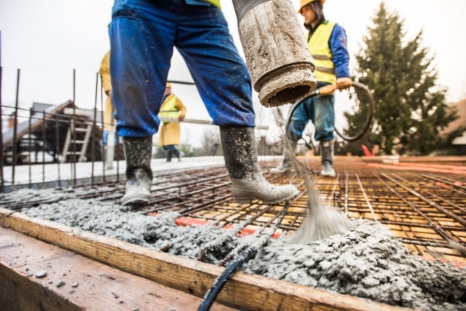In the world of construction, concrete is a fundamental building block, integral to the foundation and structure of countless modern buildings. From skyscrapers to bridges, concrete’s influence is pervasive, shaping the built-up environment around us. In this article, we’ll discuss the aspects of concrete that make it not just a material choice but a necessary element of contemporary construction. We’ll also list its many benefits, ranging from its economic feasibility to its remarkable versatility in applications.
What is Concrete?
Concrete is a composite material commonly used in construction. It consists of a binder (typically cement), water, and aggregates like sand, gravel, or crushed stone. When these components are mixed, the cement and water form a paste that coats the aggregates. This mixture then hardens over time, turning into a stone-like material.
Concrete is valued in construction for its remarkable strength, durability, and flexibility, contributing significantly to the structural integrity of buildings. These qualities have made concrete a dependable and durable material, favored by construction firms for a wide range of projects, including both commercial and residential buildings.Top of Form
Benefits of Concrete
- Economical Nature – Concrete’s cost-effectiveness is a primary reason for its widespread use. The major ingredients of cement, water, and aggregates are readily available at low cost across the globe.
- Ambient Temperature Hardening – Concrete’s ability to set, harden, and gain strength at room temperature is a distinct advantage. This property allows it to be used irrespective of weather conditions, with the potential for optimization using admixtures.
- Malleability and Casting – In its fresh, liquid state, concrete can be poured into various forms and shapes, allowing for creative and complex structural designs. This adaptability allows concrete to produce various desired shapes and sizes at construction sites.
- Energy-Efficient Production – The production costs of concrete are significantly lower compared to other construction materials like steel or polymers. This lower energy requirement for both plain and reinforced concrete makes it a more sustainable choice in construction materials.
- Water Resistance – Concrete exhibits excellent water resistant characteristics, making it ideal for underwater and submerged applications such as pipelines, dams, and waterfront structures. Unlike wood or steel, concrete can withstand prolonged water exposure without significant deterioration.
- High Temperature Resistance – Concrete can withstand high temperatures better than wood or steel, making it suitable for fireproofing and high-temperature applications. Its main binder, calcium silicate hydrate, remains stable up to 1,670° F.
- Environmental Benefits – Concrete’s ability to incorporate and recycle industrial wastes like fly ash, slag, and waste glass reduces its environmental impact. This recycling not only diminishes waste but also improves the properties of concrete without compromising its structural quality.
- Reinforced Concrete Applications – Concrete pairs well with steel in reinforced concrete applications. Its coefficient of thermal expansion is comparable to steel, providing protection in corrosive environments and contributing to the compressive strength of structures.
- Low Maintenance Requirements – Concrete structures require minimal maintenance compared to steel or wooden structures. This characteristic significantly reduces long-term upkeep costs, as there is no need for regular coating or painting.
- Versatile Application Methods – Concrete’s flexibility extends to its application methods. It can be hand-applied, poured, pumped, sprayed, grouted, and used in advanced applications like shotcreting in tunnels, demonstrating its adaptability to various construction requirements.
Concrete stands out as an indispensable material in the construction industry. Its significance is bolstered by an array of beneficial properties. It’s economical nature, combined with its adaptability to various environmental conditions and efficiency in production, underscores its pivotal role in modern construction. The ability of concrete to resist water and high temperatures, coupled with its low maintenance requirements and environmental sustainability, furthers its status as a foundational element in building and infrastructure development. As we advance in architectural and construction technology, concrete remains a constant, evolving to meet the diverse needs of modern construction.
Brannan Companies, with over a century of service in Colorado, offers a comprehensive range of construction materials and services. Our portfolio includes aggregates, asphalt materials, Ready Mix concrete, and specialized construction services. With a rich history that began in 1906 with John W. Brannan’s gravel business, we have expanded our company significantly. Key milestones include the introduction of an asphalt division in 1943, a Ready Mix concrete division in 1995, and the establishment of Brannan Construction Company in 2003 for pipeline and utilities construction.
Today, Brannan stands out in the construction industry for our extensive experience, knowledgeable team, and wide-ranging services. We provide a one-stop solution for construction needs, backed by a commitment to safety, innovation, and customer satisfaction. Our history of contributing to major projects showcases our capability and reliability. We invite potential clients to learn about our story, view past projects, and discuss future collaborations.
For more information about the products and services we provide, contact us via our website or give us a call at 303-534-1231.

